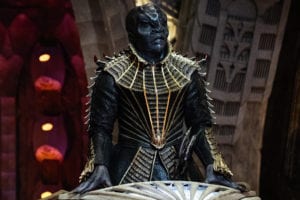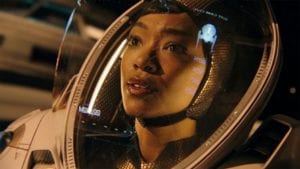Star Trek: Discovery comes to CBS All Access with an enormous legacy to hold up, a history of problems to struggle against, and a monumental task of being new in a series 50 years old. Airing on September 24, Star Trek: Discovery made fast forays into the Star Trek universe, immediately solidifying itself as a member of the long history of the United Federation of Planets while bringing new questions and considerations to the series’ history of interstellar exploration.
CBS All Access aired episodes 1 and 2, but for the sake of review, I’ll touch on only the first episode now.
Episode 1: The Vulcan Hello
In an undisclosed area of space, a Klingon leader, T’Kuvam (Chris Obi) rallies his troops. He speaks of a coming threat, of “lighting a beacon” and joining the 24 houses of the Klingon Empire against the common enemy: those with the cry “we come in peace.”
The year is Stardate 1027.3 (May 11, 2556—and thank you for finally giving us a comparable calendar year). After a successful mission on an unnamed desert planet, First Officer Michael Burnham (Sonequa Martin-Green) and the crew of the U.S.S. Shenzhou investigates a damaged relay on the edge of Federation space. Unable to identify a mysterious object which may have been—or continues to be—causing the damage, Captain Philippa Georgiou (Michelle Yeoh) allows Burnham to don a flight suit for a 20-minute flyby.
As Burnham investigates the large, unknown object, she is cut off from the ship, the object’s scattering field interrupting all communications and visuals. A Klingon appears on the outside of the ship-sized object. When he gestures at Burnham with a weapon, she lunges and kills him. Her own suit is damaged and she is unable to respond to the Shenzhou’s hails, even as radiation breaks down her body. The Shenzhou is at last able to reach her and beam her aboard.
As Burnham recovers in sickbay, she dreams of her childhood on Vulcan. During a routine study session, she is bombarded about questions regarding a Klingon attack on a Human-Vulcan science station. Unable to answer the dreaded question—“how many survivors”—young Burnham ceases the study session. A nearby Sarek scolds her.
On the Klingon ship, the Klingons mourn the passing of their torchbearer, Rejac. They vow vengeance.
Upon waking, Burnham immediately goes to the bridge to alert Captain Philippa of the Klingon threat. Although she and Science Officer Saru (Doug Jones) are skeptical due to her injuries and Burnham’s admittedly disdain for the Klingons, Captain Philippa issues a red-alert. The large Klingon vessel suddenly materializes before them.
Aboard the vessel, the Klingons discuss whether or not to destroy the Shenzhou now. T’Kuvam tries to enlist Rejak’s brother to be the new torchbearer, but he questions the task. A pale Klingon, Voq “son of none,” volunteers for the position. Although originally rejected and mocked because of his lack of connection to a Klingon house, after a brutal display of his loyalty to the cause and “the Light of Kahlessi,” he is awarded the task. T’Kuvam goes so far as to give him his own ancestral sword.
Aboard the Shenzhou, scans reveal the Klingon vessel is covered in coffins of recent and long-passed Klingon warriors. Starfleer Command orders the ship to remain but take no action, as to not incite the Klingons further but to also protect nearby colonies who have no other defenses. After a high-frequency attack from the Klingons, Burnham retreats to her quarters to contact Sarek. They suspect the unusual tactics of this Klingon vessel indicates a change in the Klingon Empire: a new leader rising, set on making some sweeping change. After consulting with him about Vulcan relations with Klingons—and a warning from Sarek regarding an incident of her distant past—Burnham returns to the Captain.
She recommends to Captain Philippa they attack the Klingons first, citing precedence established by Vulcans after a Klingon ship destroyed a Vulcan vessel. Calling it “the Vulcan Hello,” Burnham argues that the initial strike has been seen as a mark of respect, demonstrating power, and has led to relative peace between Klingons and Vulcans. Captain Philippa refuses, reminding her of the Federation’s principles. She orders Burnham to stand down, and Burnham incapacitates her. Burnham takes command of the ship, lying to the concerned crew about the Captain’s whereabouts. She orders the strike, but before it can be carried out, Captain Philippa intervenes.
The Shenzhou’s sensors detect multiple warp signatures, and several Klingon ships drop out of warp before them.
Episode Impressions
Star Trek: Discovery is a beautiful show. With a budget of $8-8.5 million per episode, it rivals the cinematic quality of recent sci-fi blockbuster films and popular series like Game of Thrones. The designers—costume, props and setting alike—have done their ample best to make Star Trek: Discovery fit in the Star Trek world while making it unique in and of itself. Although it takes place Enterprise and The Original Series, Discovery features the sleekness of the reboot movies, without some of their common issues. Gone, for example, are the slacks and skirts that separated male and female crewmembers. Everyone is clad in uniforms with paneling appropriate to their designation: command gold, science silver, operations copper.
Die-hards of the series will probably dislike the altered color schemes from science blue and operation/command red, but the color choice works. It maintains the integrity of the distinguishing mark with the largely blue uniform Discovery crews now wear.
The ship itself is redesigned with more of the reboot films in mind: steel and glass, blue paneling and touch screens galore. Anachronistic to the time line—since Discovery precedes TOS, its tech shouldn’t be better—it allows for better immersion of an audience no longer awed by 1960s special effects; once again, the changes work.
Starfleet isn’t the only thing that’s physically changed, however. The Klingons are once again retconned, both appearance and behavior. It’s a risk, playing with a species that has one of the most established lore in the entire series, but Discovery does it pretty well. With updated prosthetic and clothing reminiscent at once of noble garb and warrior armor, the Klingons are distinct among their previous incarnations. And for good reason. Discovery’s Klingons are hinted to be breaking from the Klingon Empire, with a religious fervor heretofore unseen and a fierce desire for the unification of the 24 ancestral houses against the Federation.

According to Klingon lore, by the 22nd century, this is no longer an Empire goal .
The inclusion of those more religious, ancestral Klingons to Discovery opens up new avenues for exploring for the race’s history. Perhaps, we’ll have more information about the Klingon plague used to explain the physical changes of the Klingons. But they could be setting up something else.
But visuals aren’t what make Star Trek Star Trek. It’s the characters and story that make a Star Trek series worthy of its moniker, and Discovery boasts an excellent cast with a story that has the potential to go where no Trek has gone before.
In a nod to TOS’s duality of the human condition, Discovery follows First Officer Michael Burnham. Played by Sonequa Martin-Green of The Walking Dead fame, Michael Burnham is a human raised on Vulcan (adopted by Sarek after an undisclosed event with the Klingons that led to the death of her parents). Burnham struggles with the Vulcan logic drilled into her through her life among them and her natural human inclinations—all of which shows up beautifully in her relations with others, her laughter and excitement at things like flying, and her quick and admittedly rash decisions like nerve-pinching her captain.

Moreover, Burnham shows what Trek should have been showing long before: not the elimination of human weakness like anger and prejudice, but the fight against the worse parts of human nature. The struggle against them, the struggle to come terms with them, the struggle to move past them. Burnham’s logical and illogical hate for the Klingons has enormous potential as the show sets up questions about anger, prejudice, trauma and belief.
Opposite her is the first non-white female Starfleet Captain Philippa Georgiou, played by veteran actress Michelle Yeoh. Although I have concerns about her longevity in the series—being listed as a “guest appearance” in the title card is never good—she quickly establishes herself as representative of the Star Trek establishment TOS lovers know and love. And should question. She fervently believes not only in her crew but in the ideals of the Federation. Even when, perhaps, she shouldn’t. Even when, perhaps, it’s not as simple as she thinks. When, perhaps, reality makes idealism too hard for the injured, the traumatized, the hurt to swallow.
Science Office Saru, played by Doug Jones who is well known for his creature work, rounds out the named cast in episode 1. The first Kelpian in Starfleet—and in Star Trek, as the race was created for Discovery especially—he provides an interesting outlook on the always-largely human vessel. His species was hunted and bred, and thus have evolved a sense of death never before seen. Paired with Burnham’s conflict and Georgiou’s determination, he brings a new perspective that rounds out the human emotional trinity: uncertainty and terror.
There are no other significant Shenzhou crew members which, like a “guest starring” label in the title card, is not a good sign.
It’s still too early to pass a definite ruling on Star Trek: Discovery, but the pilot shows intense promise. With nods to the old while striking out toward the new, story and character set ups that start asking deep questions, Discovery has the potential—and so far the willingness—to go where no other Star Trek series, TV or film, has gone before.
Pilots, however, can be deceiving, as TOS learned in its two-pilot fiasco. And Star Trek: Discovery has had enough problems prior to airing to give some pause.
And there’s significant problem of the paywall.
Still, there is a good deal to hope for. Growing pains in the dialogue—occasionally awkward and heavy handed—and character interactions have time to sort themselves, and with the writers they have, I think they will.
Discovery has the foundation it needs for greatness. Great cast, great production value, great writers. But most importantly, it has the willingness to be new without forgetting the old. It has a willingness to make the old better.
And that is something to look forward to.
Star Trek: Discovery airs on CBS All Access every Sunday, 8:30 eastern central.

